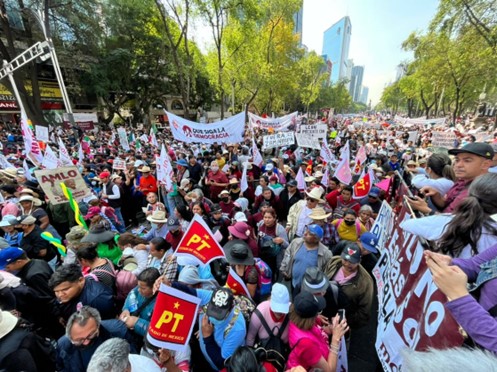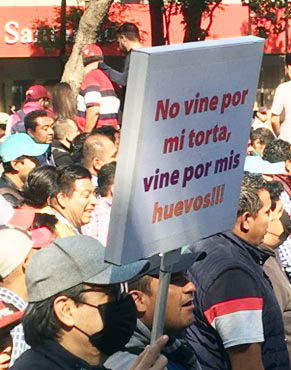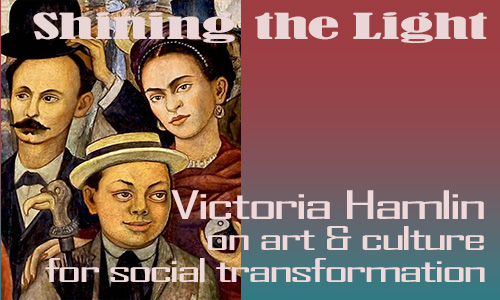|
|
|
|
The weekly newsletter of the México Solidarity Project |
|
|
|
Online at mexicosolidarityproject.org |
|
December 7, 2022/ This week's issue/ Meizhu Lui, for the editorial team |
|
|
Photo: José Luis Granados Ceja |
|
AMLO’s Fans: Neither Bused Nor Bribed |
|
Take your New York Times, your Washington Post, or your Mexican Reforma newspaper and throw them in the trash. Our mainstream media described Morena’s big march on November’s last Sunday as a big hoax, with people acarreado, bused in, obligated to attend or simply bribed with free sandwiches.
México’s PRI, the party that kept itself in power for 70 years, habitually used those sorts of tactics to claim widespread political support. Morena supporters figured in advance that the pot would call the kettle black, that their opponents in PRI and other parties would try to discredit their march by charging that Morena was using those same old tricks.
The Morenistas came prepared to counter those charges. The signs of the marchers carried their rebuttals. “I came,” one read, “by metro!” Read another: “I came by myself and I made my own sandwich!” And let’s get real. Simple reality refuted the PRI charges. Morena could not have possibly bused in 1.2 million people or made them all enough sandwiches!
IIn our interview this week, José Luis Granados Ceja looks back on Morena’s historic march from the perspective of the participants, ordinary working Mexicans who admire and love AMLO. They loved him when he ran for president in 2006 — and then became outraged when fraud cost him the election.
That fraud was never addressed by the National Elections Institute, the INE, the institution that the opposition rallied to defend in their own march three weeks ago. Their slogan: “Don’t touch the INE!” That demo’s organizers from the right-wing PAN party hid their machinations by not taking the podium. The demo’s only speaker: INE’s current head, who, by the way, stands to lose his cushy sinecure if lawmakers enact AMLO’s electoral reform.
Neoliberal leaders throughout the Western world want to see AMLO fail. Does AMLO’s status as one of the world’s most popular presidents have them jealous? Maybe if, like AMLO, they both raised their society’s floor and lowered the ceiling, the people would love them too. |
|
|
|
Don’t miss an issue. Subscribe to the weekly México Solidarity Bulletin! |
|
|
|
|
Morena on the March: History in the Making |
|
The México City-based writer and photogapher José Luis Granados Ceja, a former teleSUR staff writer, currently works on a freelance basis. Ceja’s journalism focuses on contemporary political issues, particularly those that involve grassroots efforts to affect social change in México and throughout Latin America. His regular efforts include a monthly column here in the México Solidarity Bulletin. Earlier this fall, one of his columns focused on how right-wing journalists are influencing US public opinion about AMLO.
Oh my! You attended the Morena march on Sunday, November 27. Tell us about it!
November 27 will go down as a historic day. México the day after the march would not be the same as México the day before. Throngs of people came from every state of México, and Mexicanos came from the United States as well, all together some 1.2 million strong. |
|
|
This march had no specific event to celebrate, no impending election to influence. This march didn’t protest any specific policy. The marchers were simply showing their enthusiasm for the reforms that have improved their lives since Morena took the reins of government. They were giving their president, AMLO, an outpouring of love. I found the mood all day jubilant, the enthusiasm palpable.
The people filling the streets treated AMLO almost like a rock star. They came eager to get a glimpse of him. They hoped to be close enough to shake his hand. To meet as many people as possible, AMLO walked the entire 2.5 miles from México City ’s Angel of Independence monument to the Zócalo, a six-hour walk in the blazing sun, with no military or police presence.
“The people,” AMLO has always said, “will protect me.” And indeed the entire event went peacefully. As a leading local official put it: “Not even one plate was broken.” |
|
Just two weeks earlier, between 80,000 and 160,000 critics of AMLO marched to protest his plan to reform the National Electoral Institute, the INE, the federal agency that oversees elections. They called his reforms a blow to democracy.
That protest’s real purpose amounted to an attempt to unite an opposition bloc to Morena in advance of the 2024 election. |
|
|
Photo: José Luis Granados Ceja |
|
Claudio X Gonzalez, the son of a business magnate, organized the protest, and he had in the crowd a who’s who of the right-wing PAN party, people like former Mexican President Vicente Fox and Margarita Zavala, the wife of former President Felipe Calderon.
Opposition leaders appear convinced that the 2018 election that put AMLO in office represented just a “hiccup” in Mexican political history. They want to return to business as usual. They filled their demonstration with vitriol, hate, and racism. They threw insults at AMLO, calling him “indigenous” and “low-class” — words some of us might see as positives! The ugly mood of that rally could not be more different from the festive, joyful energy of the Morena rally. |
|
But do you see any validity to the desire to preserve the INE as is? What reforms is AMLO proposing? |
|
The INE has organized elections, its job. But AMLO is taking aim at the financial privileges of the members of the INE General Council, people paid out of public resources as much as $418 a day US, 49 times more than the Mexican minimum wage and twice as much as México’s president! Besides a salary, they each get their own expense account. |
|
|
Photo: Luis Castillo |
|
AMLO has pledged “republican austerity.” The word “austerity” makes us think of neoliberal policies that cut public benefits and impoverish the poor. This AMLO “austerity” does the opposite. It puts the bloated bureaucracy on a diet and cuts benefits for those at the top. As AMLO has said, “You can’t have a rich government and a poor population.”
The need to cut the bloat also explains why AMLO is proposing to trim 200 diputados not directly elected from any particular geographic district from the lower house. These diputados, chosen from party lists, have no accountability to any constituents. They are only accountable to their party. Cutting these positions would make Congress more democratic and also mean big savings. That makes this proposal very popular with Mexicans. |
|
AMLO’s final financial reform would cut public subsidies to political parties. They get monthly payments for their everyday expenses, coming to $550 million in US dollars a year.
AMLO wants only to pay for party expenses during elections. |
|
|
The increases in the Mexican minimum wage over AMLO’s term of office |
|
So the reforms go far beyond the reforms particular to INE, the only reforms the opposition rally mentioned. But México’s working people correctly see all the proposed reforms as ways to strengthen democracy.
In spite of this huge show of popular support, political observers don’t expect AMLO’s reform proposals to pass. Why?
Constitutional amendments require a two-thirds vote in Congress, and Morena does not have the numbers. But Claudio X and his buddies, all euphoric in public after their protest, have been privately worried. Their oppositional coalition of PAN, PRI, and the PRD remains precarious. AMLO has been able to peel away some PRI and PRD votes in the past, and, given what happened with the big Morena march, some of the opposition may be nervous about being too oppositional.
How does the US media coverage of the pro-Morena march compare to the coverage of the pro-elite rally? |
|
The sparse US media coverage painted the PAN protest as a huge slap in the face to AMLO and his policies. That coverage served as an echo chamber for the accusation that AMLO rules as an anti-democratic demagogue, someone as bad or worse than previous PRI presidents.
Media stories, for example, repeated the false claim that people were bribed and then bused to the rally. Marchers humorously refuted that charge. One sign read: “No vine por mi torta, vine por mis huevos!” Rough translation: “I didn’t come because of a sandwich, I came because I have balls.”
The huge Morena march should put to bed any doubts about what the masses of México’s working people think of their president. |
|
|
Photo: Daniel McCool |
|
What do we in the US left need to know?
This is how history happens! It’s too early to call the Morena march a “watershed” moment, although I hope that will turn out to be true! The social movements and the left in and out of Morena have just criticisms of AMLO and this government. Sometimes, for example, his republican austerity cuts go too far, But Sunday’s march could tip the balance of forces to the left. It’s now up to us to take the next steps.
AMLO is not a socialist, but what he is now calling “Mexican humanism” moves us closer to a socialist path. I’d suggest that the US left pay a lot of attention to what’s going on in México. Right under your noses, the beginnings of a socialist endeavor are stirring. |
|
|
Art That Truly Rates as ‘Fine’ |
|
European art has long focused on “easel” art, largely portraits of dead white guys. That style became defined as “fine art.” |
|
This has changed some in recent years. Art that has grown organically out of the lives of poor and working people, people who are off that “fine art” grid, has started to be popular in galleries and museums. Finally! Cuz it’s great stuff! Here are three ways artists use “canvases” that spring from daily life. |
|
|
The New York Times featured Soumya Karlamangaya this past spring in an article celebrating the 52nd anniversary of San Diego’s Chicano Park. |
|
Back in 1970, Chicano activists took over that park and covered its pillars, walls, and other concrete surfaces. In 2017, Chicano Park became a National Historic Landmark, and National Park Service recognition may be coming as well. |
|
|
Murals at Chicano Park, John Francis Peters/New York Times |
|
|
At the Mingei International Museum in San Diego, an exhibition called Piñatas: The High Art of Celebration shows how something commonplace can be elevated to something really unusual and creative. Piñatas as canvas. Who would have thought it? |
|
Piñatas/Mingei International Museum |
|
PBS has done a piece about California ending a cruising ban that targeted Chicano low-rider culture. Judy Woodruff interviews low-riders who clearly see their cars as “canvases on four wheels,” not just machines. The cars express feelings about the community culture and history, and now their art can be viewed by those in neighborhoods they cruise through. |
|
|
So maybe The Art World has started to become more aware that art by and about ordinary people and how they live life can be just “fine.” That’s good. But these beautiful connections between art and life have always been there, if only eyes opened wide enough to see. |
|
Activist Vicky Hamlin is a retired tradeswoman, |
|
|
|
Recent news reports and commentaries, from progressive and mainstream media,
W. T. Whitney Jr, Morena Completes Four Years, Hitavada. Morena is “winning the streets,” but conservative political parties enjoy an overwhelming presence on social media and newspaper front pages.
Carlos Montesinos, Gobierno, IP y obreros acuerdan incremento al salario mínimo; llega a 207 pesos diarios, Indigo. “A pesar de la inflación hemos venido avanzando en la recuperación del salario mínimo”, dijo Luisa María Alcalde, secretaria del Trabajo, al anunciar el aumento para 2023.
Max de Haldevang and Rafael Gayol, AMLO’s High Popularity Isn’t Unusual for Mexican Leaders, Bloomberg News. But no president four years in office has over the past four decades had as high a polling approval rating as López Obrador.
Emir Olivares Alonso, Ante Biden y Trudeau, insistirá AMLO en la integración continental, La Jornada. El presidente Andrés Manuel López Obrador planteará su propuesta sobre la integración de las naciones de América, en un modelo similar al de la Unión Europea.
Jon Martín Cullell, México’s ban on genetically modified corn creates new trade friction with US, El Pais. Mexican environmentalists opposed to agrochemicals and genetically modified organisms are calling for their government to resist US pressure.
Hay repudio de la gente hacia Monreal, le urge definirse, dicen Citlalli y Delgado, Sin Embargo. El Senador Ricardo Monreal Ávila, líder de Morena en la Cámara Alta, ha generado el repudio de la gran parte de la sociedad hacia su persona por no haber definido si se permanecerá en el partido para apoyar al proyecto de la Cuarta Transformación y por mantener una relación cercana a la oposición.
No ceder a presiones de Estados Unidos en materia de maíz transgénico: Greenpeace, La Coperacha. La organización ambientalista Greenpeace llamó al gobierno mexicano a no ceder ante las presiones de Estados Unidos sobre la prohibición de importaciones de maíz transgénico. |
|
|
The Mexico Solidarity Project brings together activists from various socialist and left organizations and individuals committed to worker and global justice who see the 2018 election of Andrés Manuel López Obrador as president of México as a watershed moment. AMLO and his progressive Morena party aim to end generations of corruption, impoverishment, and subservience to US interests. Our Project supports not just Morena, but all Mexicans struggling for basic rights, and opposes US efforts to undermine organizing and México’s national sovereignty.
Editorial committee: Meizhu Lui, Bruce Hobson, Bill Gallegos, Sam Pizzigati, Courtney Childs, Victoria Hamlin, Agatha Hinman, Steven Hollis. To give feedback or get involved yourself, please email us! |
|
|
|
Web page and application support for the México Solidarity Project from NOVA Web Development, a democratically run, worker-owned and operated cooperative focused on developing free software tools for progressive organizations. |















